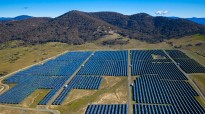The future of energy is changing, and to make sure we change with it too, we have some initiatives and projects underway that are focused on innovative technology.
Neighbourhood-scale batteries in the ACT
We are collaborating with the ACT Government to install three neighbourhood scale batteries across Casey, Dickson, and Fadden.
Neighbourhood-scale batteries are front of the meter batteries installed across the Low Voltage network.
They provide a means to ‘soak’ up excessive solar generation and store it in the local network. This stored energy will be used later in the day when it is needed.
Each battery will be connected to an electrical substation in the area, which services between 60 and 120 households and expect these batteries to be installed in 2025.
Network visibility and analytics trial
This trial seeks to improve Evoenergy’s visibility in the low voltage (LV) network for Demand Management (DM), network planning, performance, and connections.
The trial establishes data analytics tools by utilising existing network information and procuring power quality data from smart meters to enable further use cases.
One of the key capabilities is the ability to monitor load, utilisation and network performance of the LV network including consumer behaviour insights related to critical demand drivers such as Consumer Energy Resources (CER) and Electric vehicle charging.
This project has also developed the capability to improve CER integration by identifying thermal and voltage constraints, CER compliance and neutral integrity monitoring.
Project Converge
This project brings together the Australian Renewable Energy Agency (ARENA), the Battery Storage and Grid Integration Program at the Australian National University (ANU), the ACT Government and Zepben.
Project Converge will implement shaped operating envelopes (SOE) in our electricity network.
SOE provide a multi-dimensional view of the best operational conditions for an asset. It helps distributors like Evoenergy make informed decisions about when and how to deploy energy.
These are new to Canberra’s electricity network and will enable two-way energy flows, network constraints and import/export capability for each solar and battery connection.
The project researched and demonstrated SOE ability to provide demand management capabilities including:
- Reducing peak demand.
- Deferring asset augmentation using non-network options.
- Maintaining supply reliability.
- Maximising integration of renewable generation.
The project showcased how Evoenergy could implement DM with potential to reduce long-term network costs caused by increased CER through SOE.
Final project knowledge sharing reports can be found online.
Electric Vehicle Trials
We’ve completed a number of trials to understand electric vehicle charging behaviours and how EVs interact with the electricity network. Some of these projects include:
- Realising Electric Vehicle-to-Grid Services (REVS): funded by the Australian Renewable Energy Agency (ARENA), the trial banded together a range of consortium members to monitor how EVs can inject electricity back into the grid at times there is a high strain on the network. The Nissan Leaf EVs used for the trial were able to feed power back into the grid using a bi-directional charger. Read more.
- EV Grid Trial: we partnered with Jemena and JET Charge to trail how EV charging impacts the network. In the ACT, 25 customers took part in the trial and had a smart wall charger installed. The chargers allowed the EV owners and Evoenergy as the distributor to collaborate on charging usage during peak consumption times. Read more.
Ginninderry Residential Battery Trial
With the support of the ACT Government and the Ginninderry Joint Venture, Evoenergy has commenced subsidising residential batteries for up to 75 homes in Ginninderry Stage 1A to explore how small-scale solar and batteries interact with local electrical infrastructure in areas where there is 100 percent solar uptake.
Through this project, we are collaborating with these battery owners to alleviate network congestion during peak demand periods. This is being achieved through the trial of a new cost-reflective tariff designed to support the local electricity grid, and provide customers with more control over their electricity bills.
This project will play an important role in helping evolve the way we manage network demand and ensure our energy network continues to be resilient, reliable, safe and secure into the future.
We have had varying success with community engagement and, following the closure of the ACT Government’s Next Gen Energy Storage Program Grant in fiscal year 2022/23, the trial will be rescoped in order to continue to provide value to customers.
The Ginninderry Joint Venture will continue to support Evoenergy with the project rescope and assist with community engagement in order to boost participation.
See more information about the funding we’ve received for this project under the ACT Government’s Renewable Energy Innovation Fund.


